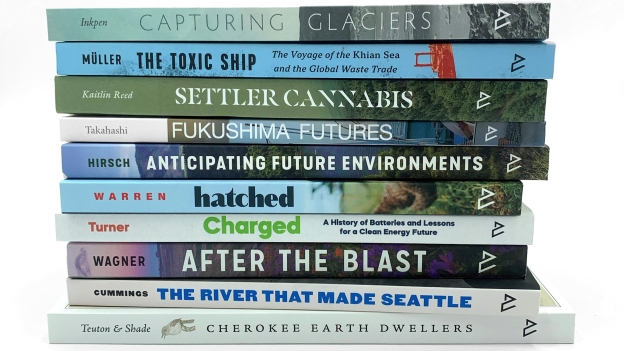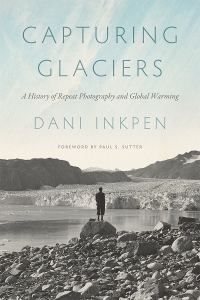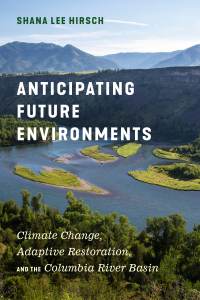For Earth Month 2024, we invite you to explore environmental awareness, advocacy, and resilience through curated reading lists. Browse books in environmental studies below and don’t miss our past selection of books on the natural world with a focus on the Pacific Northwest.
Capturing Glaciers: A History of Repeat Photography and Global Warming
Photographs of receding glaciers are one of the most well recognized visualizations of human-caused climate change. Historian Dani Inkpen explores the use of repeat glacier photographs, examining what they show, what they obscure, and how they influence public understanding of nature and climate change.
The Toxic Ship: The Voyage of the Khian Sea and the Global Waste Trade
Environmental historian Simone M. Müller uses the infamous voyage of the Khian Sea as a lens to elucidate the global trade in hazardous waste from the 1970s to the present day, exploring the story’s international nodes and detailing the downside of environmental conscientiousness among industrial nations as waste is pushed outward. Shedding light on environmental racism and justice, The Toxic Ship is “a deft philosophical and literary examination about what we throw away, where our discards go, who is harmed, and why” (Kerri Arsenault, author of Mill Town: Reckoning with What Remains).
Cherokee Earth Dwellers: Stories and Teachings of the Natural World
Ayetli gadogv—to “stand in the middle”—is at the heart of a Cherokee perspective of the natural world. Emerging from a deep and continuing collaboration between Christopher B. Teuton, Hastings Shade, Loretta Shade, and others, Cherokee Earth Dwellers offers a rich understanding of nature grounded in Cherokee creature names, oral traditional stories, and reflections of knowledge holders. From clouds to birds, oceans to quarks, this expansive Cherokee view of nature reveals a living, communicative world and humanity’s role within it.
Settler Cannabis: From Gold Rush to Green Rush in Indigenous Northern California
Yurok scholar Kaitlin Reed situates the booming California cannabis industry—dubbed the “green rush”—within a broader legacy of settler colonial resource extraction and wealth accumulation in the state. Revealing the ongoing impacts on Indigenous cultures, lands, waters, and bodies, Reed shares this history to inform the path toward an alternative future. Combining archival research with testimonies and interviews with tribal members, tribal employees, and settler state employees, Settler Cannabis offers a groundbreaking analysis of the environmental consequences of cannabis cultivation that foregrounds Indigenous voices, experiences, and histories.
Charged: A History of Batteries and Lessons for a Clean Energy Future
In this “eminently readable, elegantly precise treatise on the topic of batteries” (Science)—a finalist for the Cundill History Prize—James Morton Turner unpacks the history of batteries to explore why solving “the battery problem” is critical to a clean energy future. With new insight on the consequences for people and communities on the front lines, Turner draws on the past for crucial lessons that will help us build a just and clean energy future, from the ground up.
After the Blast: The Ecological Recovery of Mount St. Helens
Eric Wagner takes readers on a fascinating journey of Mount St. Helens through the perspective of forest scientist Jerry Franklin, who helicoptered into the blast area a couple of weeks after the eruption. From fireweed to elk, the plants and animals Franklin saw in the blast area and beyond would not just change how ecologists approached the eruption and its landscape, but also prompt them to think in new ways about how life responds in the face of seemingly total devastation—a “superb look at scientists and science at work” (Publishers Weekly).
Fukushima Futures: Survival Stories in a Repeatedly Ruined Seascape
In this study of disaster, modernization, and fishing communities, anthropologist Satsuki Takahashi examines the complex relationship between commercial fishing families and the Joban Sea—once known for premium-quality fish and now notorious as the world’s worst nuclear catastrophe. In response to unrelenting setbacks, fishing communities have developed survival strategies shaped by the precarity they share with their marine ecosystem. The collaborative resilience that emerges against this backdrop of vulnerability and uncertainty challenges the progress-bound logic of futurism, bringing more hopeful possibilities for the future into sharper focus.
The River That Made Seattle: A Human and Natural History of the Duwamish
With bountiful salmon and fertile plains, the Duwamish River has drawn people to its shores over the centuries for trading, transport, and sustenance. Unfortunately, the very utility of the river has been its undoing, as decades of dumping led to the river being declared a Superfund cleanup site. Using previously unpublished accounts by Indigenous people and settlers, BJ Cummings’s compelling narrative restores the river to its central place in Seattle and Pacific Northwest history. Writing from the perspective of environmental justice—and herself a key figure in river restoration efforts—Cummings vividly portrays the people and conflicts that shaped the region’s culture and natural environment and offers a call for action in aligning decisions about the river and its future with values of collaboration, respect, and justice.
Anticipating Future Environments: Climate Change, Adaptive Restoration, and the Columbia River Basin
Ecological restoration is often premised on the idea of returning a region to an earlier, healthier state. Yet the effects of climate change undercut that premise and challenge the ways scientists can work, destabilizing the idea of “normalcy” and revealing the politics that shape what scientists can do. Using the restoration efforts in the Columbia River Basin as a case study, UW research scientist Shana Lee Hirsch explores how climate change affects the daily work of scientists, and how a scientific field itself can adapt to climate change.
Hatched: Dispatches from the Backyard Chicken Movement
In this engaging and thought-provoking book, Gina G. Warren digs into the history and food politics of the backyard chicken movement, chronicling her own misadventures raising chickens and attempts at sustainable eating. The result is a fresh and charming story that also raises questions about sustainable farming, industrial agriculture, and our connections with the animals we love.






